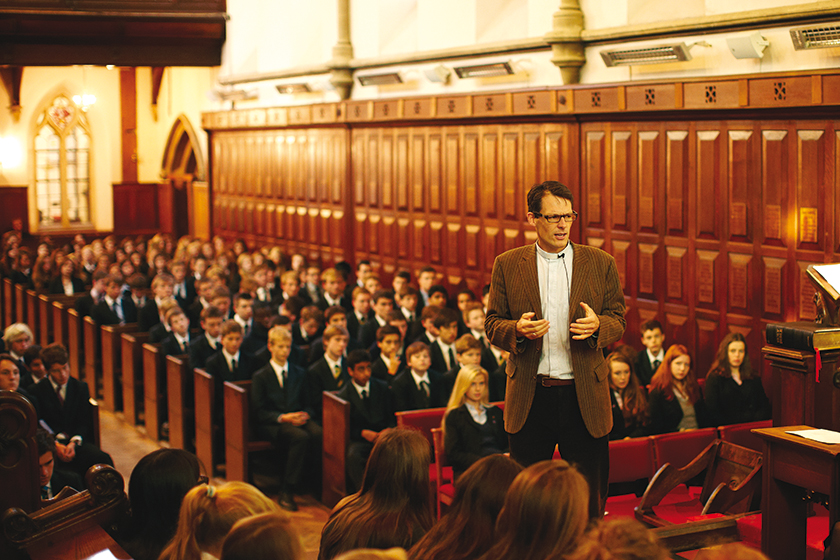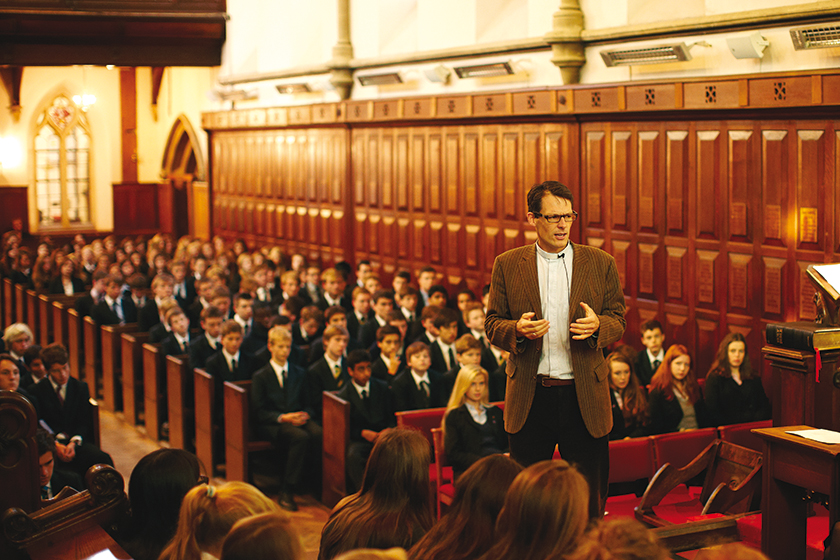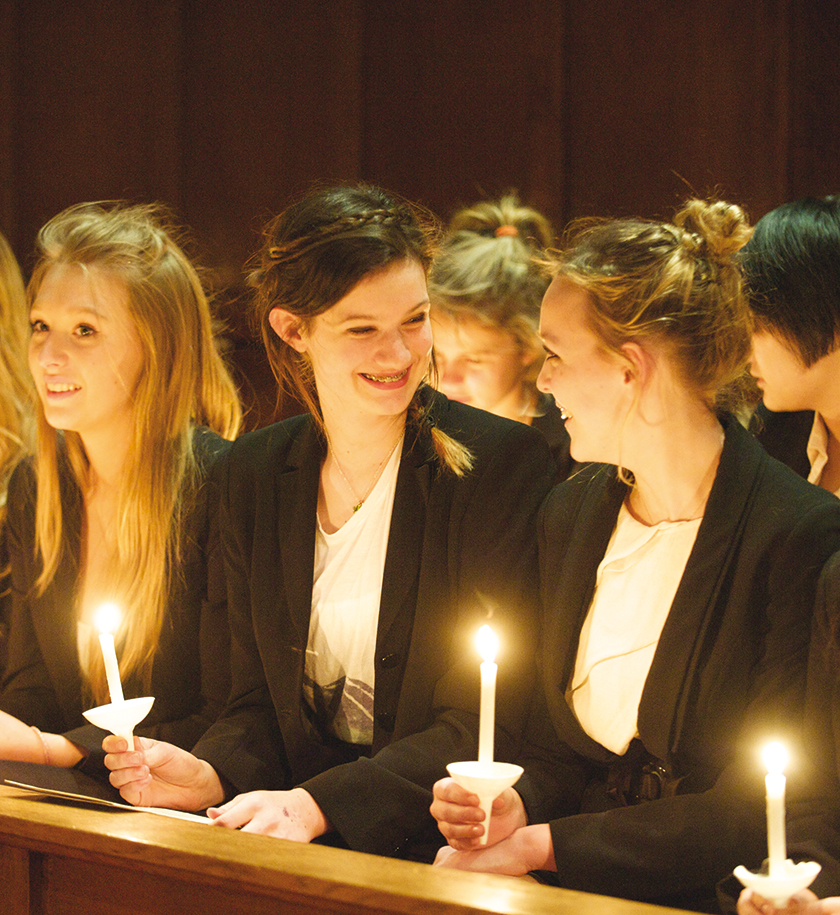
- HOME
- EDUCATION
The Importance of Religious Education Lessons
How independent schools are managing to put a tricky subject into a global context
By | 7 years ago
Religious education lessons used to be considered rather irrelevant. Not any more, says Cristina Odone, director at the Legatum Institute, and Damian Thompson, editorial director of the Catholic Herald.

Generations of British school children learned the basics of faith as part of their syllabus. Indeed, the churches opened the first schools in this country. But what served purpose in the past fails hopelessly to cater for students in 2015. An evangelical schoolchild who takes the Bible literally may take offense at jibes about creationism, while Muslim parents may withdraw their child from life-drawing art classes.
Immigrants belonging to certain religions are often hostile to ‘decadent’ Western values and homophobia remains a problem in many schools. As Joshi Herrmann reported in The Spectator, ‘even in public schools, pupils from traditional societies may bring homophobic attitudes with them, often justifying them on religious grounds’.
How can religious studies teachers navigate such treacherous waters, bridging the divide between Christians, Jews, Muslims and increasingly strident atheists, without losing sight of Britain’s Judeo-Christian heritage?
How religious education lessons differ in each sector
- State
The 1944 Education Act forced every school to hold Christian assemblies. There is still a requirement to hold gatherings at which pupils meditate on spiritual or philosophical matters, reflecting England’s Christian heritage. This has stayed on the statute books. The 7,000 state faith schools in England – 68 per cent of them Church of England and 30 per cent Catholic – adhere to this, and are free to teach their own doctrines in religious studies lessons. They are forbidden, however, to teach creationism or any other doctrine as an alternative to empirically based science. Their biology lessons must follow the national curriculum just as strictly as non-faith schools.
- Independent
The guidelines are less clear, allowing for a tailor-made approach to faith. Winchester House School, a private co-ed prep school in Northamptonshire, describes its focus as simply ‘how to lead a good life and how to be a good person’. Students are invited to talk about Cain and Abel (‘the purpose of punishment’) and Adam and Eve (‘good environment and stewardship’). This model would suit most ‘Christian’ parents fine – many are not really religious themselves, but, like David Blunkett, the former secretary of state for education, they admire that elusive ‘ethos’ found in schools with a religious foundation. It’s not just a question of right and wrong, either: even the standard bearer of atheists, Richard Dawkins, has acknowledged the need for young people to be religiously literate in order to understand the myriad cultural references to the Bible and theology.
GCSE and A-level choice
Alex Wilson, deputy head at North London Collegiate, who has taught religious studies at the independent girls’ school for 22 years, says that her subject has grown in popularity, ‘It is immensely popular as a GCSE choice and in the sixth form. We treat RE as an academic subject and the girls are taught about Islam, Christianity, Judaism, Hinduism, Buddhism and Jainism. They find the different rituals and beliefs fascinating – and so, too, the similarities.’ At North London Collegiate which, Wilson points out, boasts a student body so diverse that more than 50 languages are spoken at home, religious studies are compulsory for the first three years.
‘The staff, which include confirmed believers and atheists, do not take a confessional approach to teaching RE, but enable students to reach an informed position on religious beliefs and humanism.’
The students are quick to raise current affairs in the context of their religious studies. Wilson says her teachers encourage this, and aim to give the girls a context. ‘We want to avoid the knowledge vacuum. We say to them, part of the root of Islam is peace – and explain about the Quran and its teachings. Then they can see that this religion has nothing in common with the extremism they watch on TV. They understand that Isis is not Islam.’

At St Edward’s School in Oxford, Reverend Tom Shaw, assistant chaplain and RS teacher, finds his pupils are similarly, focusing on the way religion spills into real life.
‘I was teaching a class of Year 10s and the essay question we were preparing was “does jihad justify terrorism?”. I never answer the question for the students, but make them reflect about what questions they need to ask and investigate in order to answer them. I made them look at the issue of “jihad” in terms of someone’s world view, influenced by their politics, economic circumstances, social and cultural background – as well as their beliefs.’
Importance of teaching religious and moral education
Chapel (twice weekly) is at the heart of St Edward’s school life, and Reverend Shaw likes to tell students, who protest that they don’t believe, ‘that here in the chapel they can find peace’. Many find God, too, or at least seem to be looking for Him. Reverend Shaw has been teaching RS at the school since 1999 and is ‘very pleased’ to see that his students’ interest in theology has grown.
‘The questions students asked when I started here were mainly about philosophy; today, they are about theology and the truth claims that religions make. We concentrate on the Christian theological ideas of the incarnation and salvation.’
He argues that the study of these fundamental doctrines is not a sensitive subject, even though St Edward’s has an international intake. ‘We have children from all over the world, representing many different religions, and we have many children whose parents have no religious faith whatever. In North Oxford, secularism is a widely held belief. But studying Christian theology does not lead to the exclusion of non-Christians — quite the opposite: theology is the study of god: in other words, the study of “The Other”. And being able to see what “The Other” entails promotes a sense of empathy that is crucial to young people who are going out into a very multicultural world.’
Like Alex Wilson, Reverend Shaw places great emphasis on religious literacy: ‘The starting point for any conversation is to know what you believe in, and to be honest about how this belief shapes your life. Only then can you go out into the world and understand “religion”’.
Christianity in schools
Friar Peter Williams, the Benedictine monk who serves as school chaplain at Worth School, has been shocked by how little incoming students know about any religion. One might expect Worth, a private Catholic school attached to the Benedictine monastery in West Sussex, to attract fervent believers, determined to raise their progeny in the faith; in fact, admits Friar Williams, ‘It’s not important to parents. When they come to choosing schools, our closeness to Gatwick airport is more of a factor than our religious identity.’ Many pupils come from China and Hong Kong; very few of them are Christians, though they are required to attend the school’s acts of Christian worship.
‘In the last ten years particularly I’ve noticed that pupils arrive knowing nothing about the faith. Their ignorance of Christianity is quite incredible. That’s a challenge for us, and not necessarily a bad thing because it forces us to think about how evangelisation works.
‘We begin with an introduction to “Christian living” – to show boys and girls how faith affects our lives. The Benedictine ethos puts humility at the centre of life, and that’s completely alien to many pupils. If we can demonstrate how that works, that will appeal to students far more than anything they read in a book. But it’s a slow process.’
This kind of RE sounds very different from the rote learning the students’ parents will remember from their own school days. Alex Wilson agrees, ‘We have, to put it crudely, sex-up the subject’.
Purpose of teaching RE
At St Edward’s this translates into group discussion on topics like the rise of anti-semitism, in the wake of the Paris attacks; and the Isis videos of ‘Jihadi John’. Here ‘students develop skills and character, become empathetic and curious, and learn the importance of integrity. I want to see them committed to truth-speaking and justice-seeking’.
The head of theology at Ampleforth College, a co-ed boarding school in North Yorkshire, Alice McNeill, agrees:
‘Our purpose is not to indoctrinate. We look at the questions that religion raises, we discuss its impact on society – and its faults, too.’
McNeill, who is also chair of the Independent Schools’ Religious Studies Association, stresses that, ‘we teach in a way that challenges prejudices about religion and Christianity, and encourages pupils to look at what we have in common with other faiths’. Indeed: Ampleforth may be a Benedictine Abbey steeped in centuries of Catholic tradition, but today its remit in teaching Christian theology sounds extremely inclusive: ‘We aim to ensure that students…develop the ability to listen to other people’s points of view even if they conflict with their own… An open mind is essential.’
Big ambitions indeed, but they are welcomed by the parents at Ampleforth – and, indeed, at Eton too. Charlotte di Carcaci, whose son Tancredi, 18, is doing theology A-level at the school, found that the discipline ‘has given him an understanding of abstract concepts as well as making him think about moral issues and also the opportunity to question dogma and study the history of ideas’.
Should religious education be taught in schools?
The teaching of religion is not always so popular. Sociologists argue that as the number of believers shrinks while those who consciously embrace the faith do so more fervently than ever. The bigger the gap between the religious and secular consensus, the louder the complaints from secularists who see any form of religion in schools as, in the words of Richard Dawkins, ‘a form of child abuse’.
This hostility became evident last July, when Peter Clarke – former head of the Metropolitan police’s counterterrorism unit – said he had uncovered a ‘sustained and co-ordinated agenda to impose upon children in a number of Birmingham schools the segregationist attitudes and practices of a hardline and politicised strain of Sunni Islam’. When the council investigated the allegations, they found that in no less than 13 schools, children had been subjected to frightening propaganda. Hell awaited those children who were not good Muslims; and girls were told that, when they married, they could not refuse to have sex with their husbands because if they did, the angels would punish them ‘from dawn to dusk’. The so-called Trojan Horse scandal sparked a furious debate over the place of faith in schools, whether state or independent.
It won’t be settled easily in an atmosphere fraught with fanaticism and extremism. But it is clear that independent schools, at least, are determined to meet the challenge of teaching about god and how to lead a good life.
READ MORE: Best School Abbeys and Cathedral Schools



